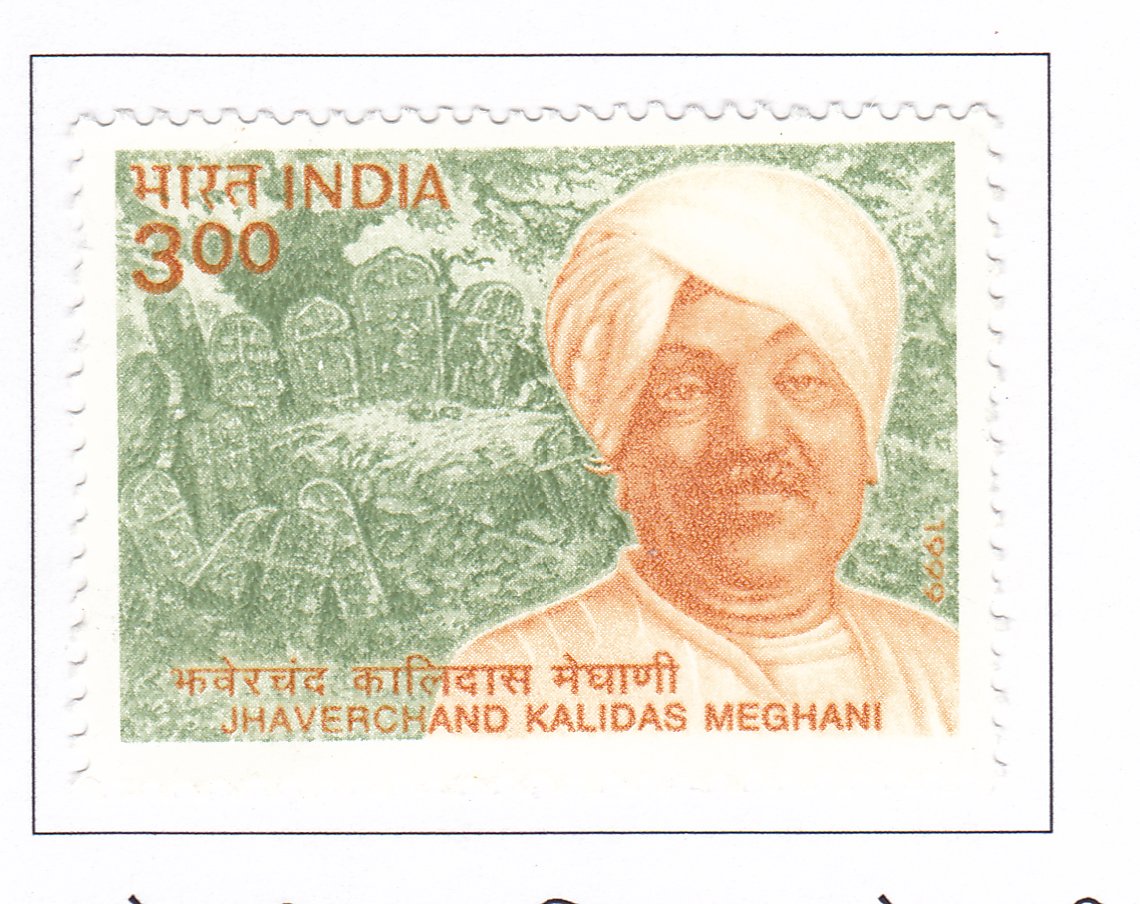Linguistic Harmony Of India – Jhaverchand Kalidas Meghani (1896-1947)

Technical Data
| Stamp Set | Linguistic Harmony Of India |
|---|---|
| Date of Issue | September 14, 1999 |
| Denomination | Rs. 3 |
| Printer | Security Printing Press, Nashik |
| Watermark | No Watermark |
| Colors | Multicolor |
| Catalog Codes |
Michel IN 1701 Stamp Number IN 1763 Yvert et Tellier IN 1468 Stanley Gibbons IN 1863 |
| Themes | Authors | Commemoration | Famous people | Headgear | Literary People (Poets and Writers) | Literature | Men |
Table of Contents
Jhaverchand Kalidas Meghani (1896–1947) and Linguistic Harmony in India
Jhaverchand Kalidas Meghani, a literary giant from Gujarat, is celebrated for his immense contribution to Gujarati literature, as well as his deep belief in the power of linguistic harmony to unite India. Known as the “Rashtriya Shayar” or National Poet, Meghani’s works played a crucial role in bringing together people of different linguistic backgrounds through his poetry, folklore, and nationalist writings.
Early Life and Literary Influence
Born on August 28, 1896, in the village of Chotila, Gujarat, Meghani grew up amidst a rich tradition of Gujarati folklore and literature. His early exposure to local legends and oral traditions influenced his creative expression, and his works later embodied the essence of regional and national unity. Meghani’s writings were not limited to Gujarati alone—his works expressed a deep empathy for the linguistic diversity of India.
A versatile writer, Meghani composed folk songs, ballads, poems, and essays, drawing inspiration from the everyday lives of ordinary people. His ability to capture the struggles, aspirations, and joys of common folk across regions contributed significantly to promoting a sense of unity through cultural and linguistic diversity.
Advocacy for Linguistic and Cultural Unity
Although he wrote primarily in Gujarati, Meghani’s work transcended regional boundaries. His ability to connect with people across India stemmed from his profound respect for India’s linguistic diversity. He believed that each Indian language carried its own beauty, cultural significance, and history, which deserved to be celebrated and preserved.
Meghani worked to create a sense of solidarity by showcasing the shared themes of Indian culture across various linguistic traditions. Through his research into folk literature and music, he collected and published volumes of folk songs and stories that highlighted the commonalities in the traditions of different Indian states. His seminal work on folk literature, such as “Saurashtra ni Rasdhar”, showcases how folk traditions can foster cultural unity by transcending linguistic barriers.
The Role of Folklore in Promoting Unity
One of Meghani’s most significant contributions to linguistic harmony was his effort to preserve and promote India’s rich oral traditions. He believed that folklore, with its universal themes and deep roots in the cultural consciousness of different regions, could be a powerful tool for fostering national unity. Meghani’s collections of Gujarati folk tales and songs often included stories of heroism, justice, and compassion, which resonated with people from different linguistic and cultural backgrounds.
By bringing these stories to a wider audience, Meghani helped build bridges between linguistic communities. His work demonstrated how, despite regional and linguistic differences, Indians shared common values and cultural motifs, which could serve as a basis for national integration.
Nationalism and the Freedom Movement
Meghani was not just a literary figure—he was deeply involved in India’s freedom struggle. Influenced by Mahatma Gandhi, Meghani used his writing as a medium to inspire people to join the fight for independence. His patriotic songs and poems, written in Gujarati, were widely circulated and sung by people across the state. However, the spirit of his message reached beyond Gujarat, as his themes of freedom, justice, and unity echoed throughout India.
Meghani’s nationalist poetry and prose encouraged Indians to rise above narrow regional and linguistic identities and embrace a broader sense of Indian nationhood. His belief in the power of language to unite people was evident in his writings, where he often emphasized the need for Indians to respect and honor each other’s languages and cultures.
Legacy of Linguistic Harmony
Meghani’s contributions to linguistic harmony in India are enduring. He helped cultivate a deeper understanding of how languages can coexist and flourish within a diverse nation. His efforts to preserve and promote folk traditions have inspired generations of scholars and artists to explore the cultural connections between different linguistic communities in India.
Meghani’s legacy lives on through his timeless works, which continue to be read and appreciated not just in Gujarat, but across India. His message of unity through diversity, conveyed through his deep love for Indian languages and cultures, remains relevant today in the context of India’s linguistic plurality.
In recognition of his contributions to literature, folklore, and national unity, Meghani’s works have been commemorated by the Department of Posts, and he is celebrated as one of the prominent figures who promoted linguistic and cultural harmony in India.
Through his writings, Jhaverchand Meghani continues to inspire people to embrace the richness of India’s linguistic diversity and to work towards a more united and inclusive nation.
